The RED Philadelphia® Stabilizer™ was designed in 1984 as
an attachment to the RED Philadelphia Collar to enhance the product's
capability as a cervicothoracic orthosis.
When applied to the patient, it greatly restricts flexion and extension
of the cervical spine.
As the patient recovers, the Stabilizer can be removed while allowing
the Collar to remain on the patient.
May be used in conjunction with the RED Philadelphia Halo or Head
Immobilizer attachment.
Every product we manufacture demonstrates our commitment to patient
compliance and recovery through superior immobilization and comfort.
|
 |
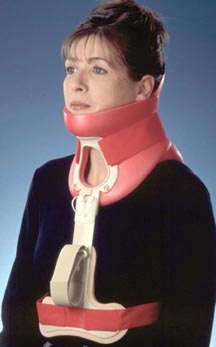 |
 |
|
|
|
- Latex-free, non-toxic and hypoallergenic Plastazote® foam
reduces skin irritation.
- Adjustable bilateral Velcro® hook and loop fasteners ensure
proper fit.
- Anterior and posterior rigid plastic thoracic reinforcement
pieces decrease movement.
- Restricts cervical spine flexion, extension and rotation to
promote patient recovery.
- Two-piece design enhances patient comfort.
- Conformance to the chest and back allows superior stability
and comfort.
|
- Water-resistant for bathing and aqua-therapy.
- Easily customized for individual requirements.
- No tools required to assemble.
- X-ray, CT and MRI lucent.
- Clean with mild soap and clean water.
- May be used in conjunction with the RED Philadelphia Halo or
Head Immobilizer attachments.
|
|
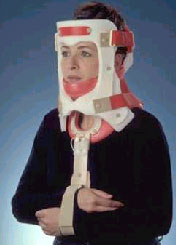 |
|
|
|
|
The Adult RED Philadelphia Stabilizer will
fit most average individuals from 5' to 6'6" when attached to
the Philadelphia Collar.
The Pediatric RED Philadelphia Stabilizer can be attached to both
the Child and Infant Philadelphia Collar.
Sizes: Adult and Pediatric. |
|
|
|
|
|
|
| For more information,
please refer to |
|
Sizes: |
|
Product
Table |
|
|
|
|
|
|
|
|
|
Custom: |
|
Services |
|
|
|
|
|
|
|
|
|
|
|
|
|
|
|
|
|
|
|
Proper application
of the Stabilizer is important for immobilization and patient comfort.
The two-piece design consists of a FRONT piece and BACK piece which
are packaged as a set.
Always maintain the patient's head in neutral alignment. These directions
are guidelines only; follow a qualified healthcare provider's instructions.
|
|
|
|
|
|
|
|
| 1. |
|
Insert the
plastic reinforcement of the Collar FRONT piece into the top of the
Stabilizer FRONT piece. Slide the pieces together until the holes
are in alignment. Repeat for the Collar BACK piece and Stabilizer
BACK piece. |
|
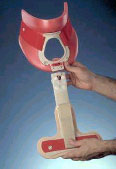 |
|
|
|
|
|
|
|
|
|
|
|
|
|
|
|
| 2. |
|
After the
Stabilizer and Collar holes are in alignment, insert the locking plugs
until the pieces cannot be separated. |
|
|
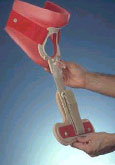 |
|
|
|
|
|
|
|
|
|
|
|
|
|
|
|
|
|
3.
|
|
After properly
applying the Collar, attach the Velcro straps located on the Stabilizer
BACK piece onto the hook fastener located on the Stabilizer FRONT
piece. |
|
|
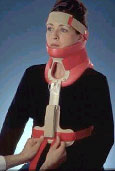 |
| |
|
| 4. |
|
Pull both straps simultaneously
and with equal pressure toward the Stabilizer FRONT piece. Verify
that all components are centered on the patient and the patient is
in neutral alignment. Fasten strap securely and remove excess material,
as necessary. |
|
|
|
|
|
|
|
|
|
|
|
Before removing the Stabilizer
and Collar, mark the position of the Velcro strap location to ensure
re-application maintains the proper fit.
With the Stabilizer and Collar secured on the patient, loosen the
Stabilizer strap on the RIGHT side and then on the LEFT side. To remove
the Collar, unfasten the Velcro strap on the RIGHT side and then the
LEFT side. Remove Stabilizer and Collar from the patient.
Plugs can be removed only when the Stabilizer is no longer necessary
and only the Collar is required, as instructed by a qualified healthcare
professional. |
|
|
|
Proper hygiene and product
cleaning are an important part of a patient's recovery. In addition,
it will keep the patient clean, comfortable and prevent skin irritation.
A qualified healthcare professional will establish your cleaning routine.
After the Stabilizer and Collar are removed, gently clean the patient's
neck and face; if there is skin irritation contact a qualified healthcare
professional. The patient's neck and face should be dried completely
before the Stabilizer and Collar are applied.
The entire Stabilizer and Collar can be cleaned with mild soap and
clean water. The Stabilizer and Collar should be dried completely
with a cloth or air-dried before it is applied to the patient. While
a mild disinfectant is acceptable, do not use harsh chemicals or bleach.
Apply the Stabilizer and Collar as instructed by a qualified healthcare
professional. |
|






